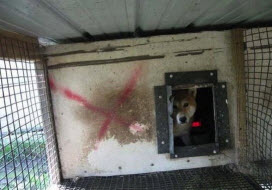Many puppy mill owners had it good for a while, enjoying a huge loophole in regulations under the 1966 Animal Welfare Act that enabled breeders who sell dogs directly to the public to abuse their animals in secret, sell them to customers sight unseen -- sometimes sick or dying -- and profit from all of it.
You see, until now, breeders who sell directly to consumers have been able to avoid government oversight and public scrutiny by selling animals through the Internet, through the mail, and over the phone, keeping everything about the animals' conditions and the breeders' operations a complete secret. No one -- not consumers, not the USDA, and in many cases not even state regulators -- took the opportunity to see what was really going on behind the closed kennel doors of these facilities. Sick puppies were sent to unsuspecting consumers and breeding dogs were left to languish in horrific conditions without anyone ever seeing them.

Last year, the ASPCA, along with several other national animal welfare organizations, gathered approximately 350,000 letters and signatures from concerned citizens in support of a long-overdue effort by the USDA to close the loophole and regulate these puppy mills once and for all. I believe each and every one of those letters helped make a difference, because this week, the USDA said, "No more." After decades of criticism from the animal welfare community, the USDA is finally closing the loophole with a new rule that will force transparency in some of the darkest corners of this deplorable industry.
And we say, thank you.
The new rule will require that breeders who own more than four breeding female dogs and who sell puppies to the public sight unseen be licensed and inspected by the USDA. The move came after a 2010 audit by the Office of the Inspector General that exposed unsanitary, overcrowded, and often cruel conditions in puppy mills around the country. It recommended that the decades-old Animal Welfare Act regulations be updated to address current industry practices.
Of course, some breeders will continue to abuse animals and evade scrutiny as long as they can make money doing so, but this federal action represents a significant step in the right direction. For the first time, federal inspectors will have the authority to go behind doors that have never been opened for inspection. Thousands of breeding dogs who have lived their entire lives inside puppy mills will be seen by regulators for the first time.
Even though the standards that apply to USDA-licensed breeders leave much to be desired, simply allowing inspectors inside these facilities will go a long way toward stemming some of the worst abuses occurring in the industry.
We've been on this beat for a while. Our "No Pet Store Puppies" campaign aims to reduce the demand for puppy mill puppies by urging consumers to pledge not to buy any items -- including food, supplies or toys -- from stores or websites that sell puppies. The site also features photos taken by USDA inspectors at licensed breeding facilities where violations were found, and a database that allows consumers to see the link between some pet stores and USDA-licensed commercial dog breeders, raising awareness about the minimal standards even licensed breeders are required to follow.
Despite all these efforts, as long as people choose to purchase -- rather than adopt -- their pets, the puppy mill industry will continue to flourish. That's why we can't let up, even in the face of good news.
We will do everything in our power to improve the lives of the dogs whose fate has landed them in the commercial breeding industry. We will continue to urge those choosing to buy a puppy to seek out responsible breeders, to always meet the desired puppy's mother, and to see where she lives.
Until the day we can trust human behavior when it comes to animal welfare, federal oversight of breeders who sell puppies directly to the public, sight unseen, will help protect thousands of dogs who, for the time being, are just more cogs in the wheel of the puppy mill industry.
And so the fight goes on.
Matthew Bershadker is President & CEO of the American Society for the Prevention of Cruelty to Animals (ASPCA). Learn more about the ASPCA's mission and programs at ASPCA.org.
